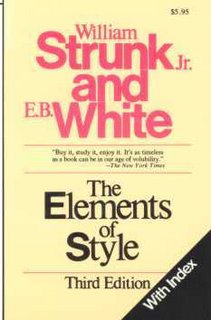Let's active
 Back in Charm City after a long Christmas weekend in my hometown. No year-end lists or New Year's wishes or resolutions, but I was able to use the down time to go through a hard copy of my script for typos, formatting, and other egregious errors (nits as they call them). I wanted to take Scott the Reader up on his $60 Script Notes offer while his desk lay fallow as well. Changes made, money PayPal-ed, and I'm leaving that one alone until Nicholl time in April.
Back in Charm City after a long Christmas weekend in my hometown. No year-end lists or New Year's wishes or resolutions, but I was able to use the down time to go through a hard copy of my script for typos, formatting, and other egregious errors (nits as they call them). I wanted to take Scott the Reader up on his $60 Script Notes offer while his desk lay fallow as well. Changes made, money PayPal-ed, and I'm leaving that one alone until Nicholl time in April.Although I imagine some Luddites and holdovers from the 20th century still do their writing on a good old typewriter, presumably most scripts are created on one form of computer or another. Not having a screenwriting software program myself at the moment, I drafted mine using WordPerfect. The word processing software of choice for attorneys, its infinite superiority over Word has been well documented. The keystroke commands and ease of double indenting in WP made it easy for me to come up with something that reasonably resembled a properly-formatted screenplay.
Whatever your tool of choice, however, there is no substitute for editing work on paper with red pen in hand. Even if you think you can catch everything onscreen, I assure you that you won't. I have no idea why this is true but my experience tells me that it is. So when you think you have it perfect in the machine, print it all out and go over it again, line by line. It's the only way to be sure.
Egregious errors aside, the thing that struck me most as I nitted my draft was the extent to which I used the passive voice in my writing. As one who teaches Plain English for Lawyers to law students, this was troubling. A cardinal rule of the plain english method is to always use the active voice when possible. Keeps the writing straightforward, to the point, and strong. Yet there it was throughout.
As a devotee of Strunk's Elements of Style, the reader will no doubt recall that in the active voice, the subject acts upon the object of the sentence:
The robber shot John.
Change it to the passive voice, and the action becomes less direct:
The robber was shooting John. or The robber had shot John.
A simple concept in theory but in practice I think many writers (including myself apparently) revert to the passive voice out of habit, tendencies toward wordiness, or simple laziness. But

5 Comments:
A nit if you will...
The robber shot John. is in the past tense, thereby making it a passive sentence as well.
The robber shoots John. would be the active version of that sentence.
We;come back! & Happy New Year!
By writergurl, at 4:04 PM
writergurl, at 4:04 PM
argh, i was trying to think of a better example of it than that sentence. well you get the idea anyway.
By Chris, at 7:54 PM
Chris, at 7:54 PM
LOL, yes, I got your drift.
Soetimes you have to do things with a bit of verve too in order to "liven" things up...
The robber jerks the gun away from John...
BAM!
... the gun smokes as
... John crumples onto the carpet, blood pouring from his forehead.
Shirley rips off the balacava.
SHIRLEY
Should've kept your pants on, babe.
How's that for some action? ;)
By writergurl, at 12:09 AM
writergurl, at 12:09 AM
Judging a screenwriting contest, I happened upon the most brilliant little gem of a script about three teenagers who win the lottery and start their own town in the desert. Their apartment has a nacho cheese waterfall; the only restaurant is a Taco Bell and they import whores from a Russian circus. It's just the kind of thing that normally offends me, but it was brilliant and original. The only problem was the spelling, grammar and punctuation, not to mention the typos. He couldn't even spell one of the character names right, Keith, as in e before i. I wrote him a note and told him never, ever to send a script in that condition to anyone, ever. I also told him he was a genius. I never did hear back from him.
By Julie Goes to Hollywood, at 9:42 AM
Julie Goes to Hollywood, at 9:42 AM
WG, I was playing off a saying we attorneys have for long confusing passages of facts -- "Who shot John?" As in "take out all this 'Who shot John?' stuff" I should have had the butler do it I think.
Julie, the thing that gets me is, if you're even reasonably familiar with basic grammar and punctuation, the nits are the easiest thing to fix with a little good proofreading. Especially with word processing programs HIGHLIGHTING them for you. It's the rest of the rewriting that's the hard part.
By Chris, at 2:28 PM
Chris, at 2:28 PM
Post a Comment
<< Home